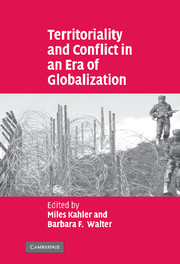Book contents
- Frontmatter
- Contents
- List of figures
- List of tables
- List of contributors
- Acknowledgments
- 1 Territoriality and conflict in an era of globalization
- Part I Territorial attachment and detachment
- 2 Bounded communities: territoriality, territorial attachment, and conflict
- 3 On giving ground: globalization, religion, and territorial detachment in a Papua New Guinea society
- 4 The resilience of territorial conflict in an era of globalization
- 5 Diasporas and homeland conflict
- Part II Territorial stakes and violent conflict
- Part III Territorial regimes in an era of globalization
- Conclusion
- References
- Index
3 - On giving ground: globalization, religion, and territorial detachment in a Papua New Guinea society
Published online by Cambridge University Press: 22 September 2009
- Frontmatter
- Contents
- List of figures
- List of tables
- List of contributors
- Acknowledgments
- 1 Territoriality and conflict in an era of globalization
- Part I Territorial attachment and detachment
- 2 Bounded communities: territoriality, territorial attachment, and conflict
- 3 On giving ground: globalization, religion, and territorial detachment in a Papua New Guinea society
- 4 The resilience of territorial conflict in an era of globalization
- 5 Diasporas and homeland conflict
- Part II Territorial stakes and violent conflict
- Part III Territorial regimes in an era of globalization
- Conclusion
- References
- Index
Summary
One of the founding images of the recent wave of globalization discourse has been that of the deterritorialized migrant. Adrift without roots in an economically integrated world, the migrant has stood as a figure for the future of us all in an era in which territory was supposed to lose its role in structuring economic and political life. In the wake of the enthusiasm this image generated, whole bodies of social theory grew up that took the experience of the migrant as the norm and used it as a basis from which to critique older theories of culture and society based on notions of territorial identification and stability (for a review, see Papastergiadis 2000). Yet as the period of early enthusiasm has passed, many social scientists have come to realize that the majority of people in the world are not on the move, and that many of those who do move do not in the course of doing so necessarily lose their feelings of attachment to their home territories (see Lyons, this volume). The shift from one position to the other has not, however, been merely an idle pendulum swing, for what the discussions surrounding issues of movement and deterritorialization have demonstrated is that the links between people and territories are complex and require examination in their own right if we are to understand how they might change in response to social forces such as globalization.
- Type
- Chapter
- Information
- Territoriality and Conflict in an Era of Globalization , pp. 62 - 84Publisher: Cambridge University PressPrint publication year: 2006
- 19
- Cited by



